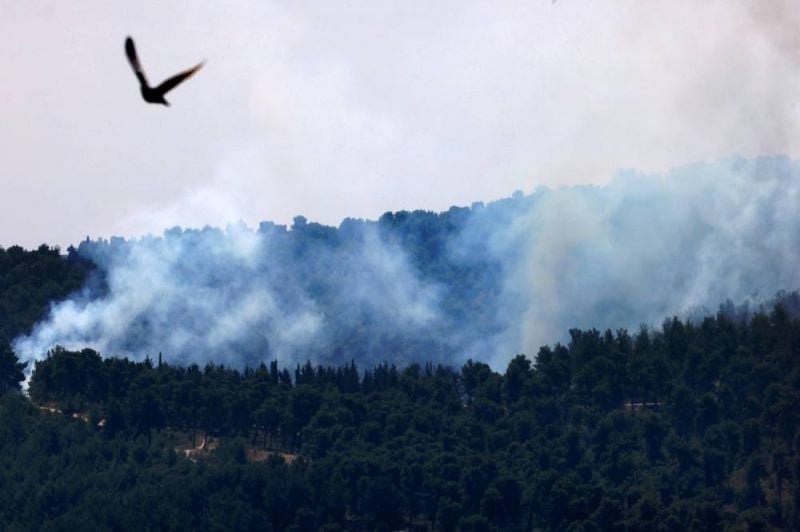
On June 3, 2024, fires erupted as a result of rockets fired from Lebanon into northern Israel, near the town of Kiryat Shmona, close to the Lebanese border. (Credit: Jack Guez/AFP)
On both sides of the Blue Line, the unofficial UN-drawn border between Lebanon and Israel, fires continued to burn through the terrain on Tuesday, ignited by rocket fire, the ensuing Iron Dome interceptions on the Israeli side and Israel’s use of white phosphorus shells, as Hezbollah and Israel fight in tandem with Israel's offensive on Gaza.
These forest fires, already threatening the South since temperatures rose last weekend, provoked vitriolic reactions on the Israeli side, with one far-right minister calling for all Hezbollah positions to be burned in retaliation.
On the Lebanese side, fires erupted in the Qabaa forest near Markaba, Marjayoun district, on Tuesday, as a result of white phosphorus shelling, according to local residents cited by L’Orient Today’s correspondent in the South. White phosphorus shelling also caused a fire in the nearby Kfar Shuba forest, in Hasbaya district. Residents called on the authorities to "mobilize quickly" as the flames threatened to engulf their homes.
On Monday evening, several rescue and firefighting units, including those affiliated to Hezbollah, announced that they had extinguished numerous fires along the Blue Line, from Sour district to Kfar Hammam, in the Hasbaya district.
On the Israeli side, over the past three days, more than 3,700 acres of land in the north of the country had been damaged by fire, Haaretz reported. Firefighters worked inside the mostly-evacuated town of Kiryat Shmona to prevent the flames from destroying homes there, although some residential properties were damaged, according to Times of Israel.
It was in Kiryat Shmona that Israeli National Security Minister, Itamar Ben-Gvir declared that "now it's the army's duty to destroy Hezbollah."
"A part of our country is hit, we shoot at it, we evacuate it. They burn our regions, we must burn all Hezbollah strongholds, destroy them. War!" he said.
On Monday evening, Israel's Channel 14 said that "the images of the North on fire could be a decisive turning point" in the war.
The wide scope of affected areas in Israel is the result of increased weapon fire from Lebanon, Israeli media reported, but specifically as a result of interceptions by Israel’s Iron Dome missile defense system.
The interceptions scatter large quantities of flammable fragments of ammunition, meaning several fires can be ignited across a wide area simultaneously. The blaze in Biriya Forest on Tuesday was burning at ten separate locations following missile interceptions, according to a report from Haaretz.
An AFP photographer in Kiryat Shmona saw intense fires devouring vast areas of the region.
"Six reserve soldiers were slightly injured by smoke inhalation and taken to hospital for medical treatment," said the army, assuring that "no human life" was in danger "at this stage.”
The Prime Minister’s Office said it was closely monitoring the fires in conjunction with the army. Israeli radio reported that the Israeli war Cabinet will meet in the evening to discuss the "escalation" along the front with Lebanon.